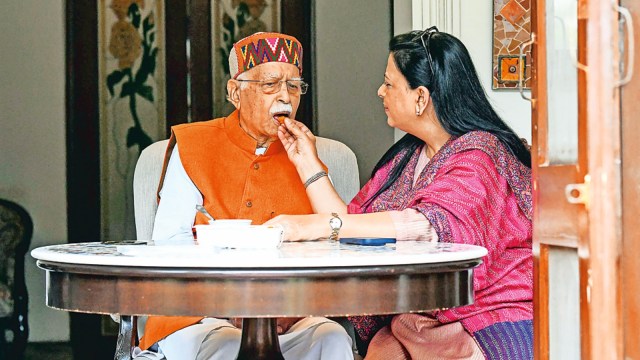


Veteran and prominent leader of the Bharatiya Janata Party, Lal Krishna Advani, was admitted to the All India Institute of Medical Sciences for observation. The 97-year-old leader served as the Home Minister and Deputy Prime Minister in the Vajpayee cabinet and was the party's Prime Ministerial candidate in the 2009 general elections. However, he later stepped back and paved the way for Sushma Swaraj to become the Leader of the Opposition.
Lal Krishna Advani: A Legend in Indian Politics
Lal Krishna Advani, a veteran and prominent leader of the Bharatiya Janata Party (BJP), recently made headlines when he was admitted to the All India Institute of Medical Sciences for observation. This article sheds light on his illustrious career, past events, and top FAQs related to him.
Early Life and Political Beginnings:
Born in Karachi, British India (now Pakistan) on November 8, 1927, Advani developed a passion for politics at a young age. He joined the Rashtriya Swayamsevak Sangh (RSS), a Hindu nationalist organization, in 1942 and later became a prominent member of the Bharatiya Jana Sangh, the precursor to the BJP.
Ascent to Prominence:
In the 1980s, Advani played a pivotal role in mobilizing the masses against the Congress government led by Indira Gandhi. He led the historic "Rath Yatra" (chariot procession) in 1990, which ignited religious sentiments and paved the way for the BJP's rise to power.
Ministerial Career and Prime Ministerial Ambition:
Advani served as Minister of Information and Broadcasting in the short-lived V. P. Singh government (1989-90). After the BJP came to power in 1998, he became the Home Minister and Deputy Prime Minister in the Atal Bihari Vajpayee cabinet. In 2009, he was the party's Prime Ministerial candidate, but later withdrew his candidature to make way for Sushma Swaraj.
Other Notable Contributions:
Beyond his political career, Advani is renowned for his authorship of the book "My Country, My Life" (2008), which chronicles his personal and political journey. He has also been a vocal advocate for a Ram temple at Ayodhya and has played a significant role in Hindu nationalist politics.
Health and Recent Hospitalization:
At the age of 97, Advani's health has been closely monitored in recent years. In August 2023, he was admitted to the All India Institute of Medical Sciences for observation. His current condition remains stable, and he is receiving medical care.
Top 5 FAQs Related to Lal Krishna Advani:
A: The Rath Yatra was a controversial chariot procession led by Advani in 1990 that aimed to mobilize Hindu sentiments against the Congress government.
A: Advani withdrew his candidature to make way for Sushma Swaraj to become the Leader of the Opposition in the Lok Sabha.
A: "My Country, My Life" (2008), which provides an inside look into his personal and political experiences.
A: As of August 2023, Advani is receiving treatment at the All India Institute of Medical Sciences, and his condition is stable.
A: Advani was a key figure in the BJP's mobilization efforts and played a significant role in uniting Hindu voters to propel the party to power in 1998.

Prime Minister Narendra Modi, in a grand event at Indira Gandhi Indoor Stadium in New Delhi, launched the year-long celebrations marking 150th anniversary of the national song 'Vande Mataram'. The event saw a mass singing of the iconic song and also featured the launch of a commemorative stamp, coin, and portal. PM Modi addressed the audience and highlighted the significance of 'Vande Mataram' in India's freedom struggle and its continued resonance with the people.

As India celebrates 150 years of its national song ‘Vande Mataram’ today, Prime Minister Narendra Modi inaugurated a year-long commemoration with the release of a commemorative stamp and coin. Calling Vande Mataram a symbol of India’s unity, PM Modi urged citizens to draw inspiration from its timeless force. He also highlighted the impact of the 1937 decision to approve only selective stanzas of the song, which he claims sowed the seeds of India’s partition. Amidst renewed political debates, the Prime Minister urged the younger generation to understand the historical context and warned against the divisive mindset that still persists in the nation.

Former White House press secretary Karine Jean-Pierre and radio host Dean Obeidallah discuss the lack of support from Democratic Party leaders for New York City Mayor-elect Zohran Mamdani during the primaries. Jean-Pierre calls it a "big mistake" and highlights Mamdani's inspiring campaign, which resonated with young voters despite lacking party backing. She criticizes party leaders for sending the wrong message and turning their backs on a Democratic nominee.

Congress leader Rahul Gandhi has accused the BJP-led NDA of widespread voter fraud in Bihar, particularly targeting Dalit, backward class, and minority communities. He claims that hundreds of voters were removed from electoral rolls without notice, amounting to “vote theft." Gandhi also alleges that this manipulation was done to specifically target marginalized groups who may not vote for the BJP. However, the Election Commission has denied these claims and stated that the voter list is regularly updated and that there is no evidence of any large-scale manipulation.

Matheus Ferrero, a photographer from Brazil, found himself at the centre of a political storm in India after one of his photos was used by Congress leader Rahul Gandhi to allege voter fraud. The image, titled "Woman Wearing Blue Denim Jacket," had been uploaded to stock photography sites and freely available for download. As the controversy intensified, Ferrero faced online harassment and had to delete his social media accounts. He explains that the photo was a free-use image and not meant to be taken as evidence of any wrongdoing.

The Democratic Party received a major boost following Zohran Mamdani's mayoral win, with both former presidents Barack Obama and Joe Biden praising his influence and moral compass in congratulatory calls. This marks a significant endorsement from two of the party's most popular leaders, potentially indicating a shift towards embracing progressive candidates like Mamdani.

In the 2025 municipal election in Conway, voters made the choice to stick with the current city leaders. Incumbents Amanda Butler, Beth Helms, and William Goldfinch were all re-elected to their positions, while challenger Tonya Robinson fell just short. Butler, who received the most votes, expressed surprise and gratitude, and said that the re-election of all three incumbents shows confidence in the current council.

The Haryana High Court has issued a third warrant for the arrest of self-styled godman Rampal, who is facing a murder charge. With pressure mounting on the police to take action, thousands of men, women, and children who were holding a protective ring around Rampal are now abandoning their position, claiming they were forced to stay there by the godman and his supporters. This walk out is seen as a victory for the police, who are worried about potential violence from Rampal's supporters and have cut off essential resources like water, power, and food to the ashram. Rampal, who has a history of missing court hearings, is now using ill health as a reason to avoid arrest.

At a state working committee meeting of the BJP in Uttar Pradesh, Deputy Chief Minister Keshav Prasad Maurya stressed on the significance of the party organization over the government. He highlighted the need for party workers to be respected and their dignity upheld. Maurya also addressed the recent electoral setbacks faced by the BJP and stated that the organization will always remain supreme.

Acclaimed poet and Aam Aadmi Party leader Kumar Vishwas has praised Dhirendra Shastri, a prominent leader of the Sanatan Dharma movement in Uttarakhand, for his efforts in bringing enlightenment and upliftment to the people. Vishwas highlighted Shastri's dedication to preserving the values of Sanatan Dharma and spreading its message across the state. This news highlights the significance of cultural and spiritual leaders in shaping the political landscape of India.